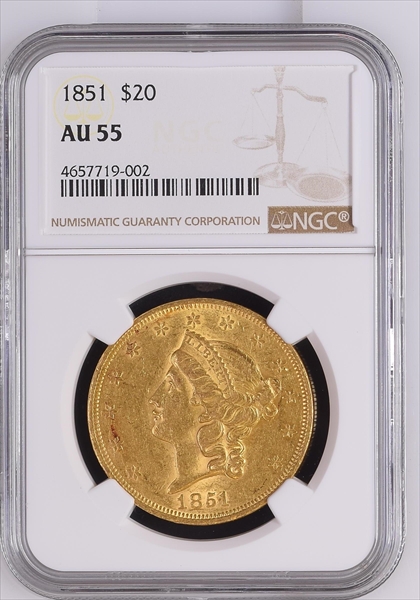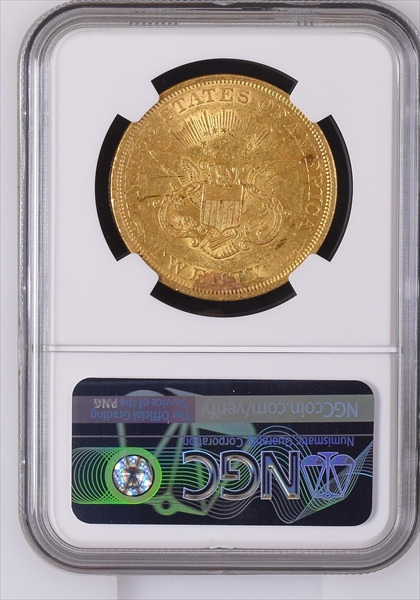1851 $20 AU55 PCGS号8904
专家评论
Doug Winter
The following information is from my eBook on Type One Liberty Head Double Eagles at http://doubleeaglebook.com/More double eagles were struck in 1851 at the Philadelphia mint than in any year until 1861. Despite a mintage of slightly over 2 million coins, the 1851 is not as common as people might think. However, it is among the most available early Type One issues in high grades, and some choice pieces are occasionally offered for sale.
STRIKE: The 1851 is an issue which comes well struck, but not as much so as the 1850. The central obverse is usually well defined with most of the individual hair strands showing separation. On some, the stars appear lightly impressed. This is due to lapping of the dies at the mint, which had the unintentional effect of removing detail. The center of the reverse is generally sharp, but some 1851 double eagles are weak on the denticles.
SURFACES: Many are characterized by heavily abraded surfaces. But there are more relatively mark-free 1851 double eagles than there are coins dated 1852 or 1853. Some show mint-made copper spotting or dark grease stains in the surfaces. These are not considered detracting unless they are extensive or poorly situated.
LUSTER: At least two types of luster are seen on this issue. The more common is satiny in texture with a delicate semi-granular finish. The second shows a thicker, harder, luster which sometimes is semi-reflective. One is not considered “better” than the author although I prefer the second variant.
COLORATION: The natural coloration for this date ranges from medium green-gold to a deep orange-gold, or even a lighter rose shade. It has become harder to find an 1851 double eagle with natural color but there are still enough coins in the market that the collector should be able to locate a nice piece without much effort.
EYE APPEAL: This date is generally found with above average eye appeal. On most, the strike, luster, and surfaces are acceptable. While there are some very unattractive 1851 double eagles in third-party holders, there are enough nice ones available that the collector should be able to locate one with relative ease.
INTERESTING VARIETIES: Varieties are known with a heavy date, and one on which the numerals are noticeably lighter. Neither of these commands a premium.
PROOFS: No Proofs were struck this year.
HOARDS: There were a total of 47 in the S.S. Republic including five in Uncirculated. There were 29 found in the S.S. Central America. And another 79 were found in the Baltimore Hoard, including a number of pieces which are comparatively choice for the issue. It is likely that small groups of this date are still being found in overseas locations and being repatriated back to the American coin market.
BUYING TIPS: This historically significant date is very popular and it has collector appeal outside of the specialist community. Date collectors tend to look either for a nice mid-range AU or they splurge for an impressive Uncirculated example. Be patient and wait for a clean, well struck piece with nice color; these coins are still available and they do not command a huge price premium over a “typical” 1850.
AUCTION RECORD: Bowers and Merena 8/10: 1811, graded MS64, sold for $34,500.
FINEST KNOWN: There are two or three known which grade MS64 but the best of these, in my opinion, is the PCGS coin in the Crawford collection. The other PCGS MS64 is a coin in an Old Green Holder which is ex Bowers and Merena 8/10: 1811 ($34,500) and earlier Heritage 1/04: 3078 ($29,900).
RARITY:
TOTAL KNOWN: 2500-3500+
BY GRADE:
Very Fine: 700-900
Extremely Fine: 1100-1500
About Uncirculated: 600-950
Uncirculated: 100-150
POPULATION FIGURES: As of the beginning of 2015, PCGS had graded 13 in MS63, 1 in MS63+, and two in MS64. There were a total of 112 in Uncirculated. NGC had graded six in MS63 and two in MS64. There were a total of 77 in Uncirculated. These figures are inflated by resubmissions, especially in MS62 at PCGS. CAC has approved one in MS60, three in MS61, six in MS62, and one in MS63 for a total of 11 coins in Uncirculated with CAC approval.
PERFORMANCE SINCE 2002: In 2002, this date was very inexpensive and a collector could obtain a nice AU example in the $750-1,500 range. In 2014, a nice AU will cost the collector in the $3,000-5,000 range.
COMMENTS: I continue to believe that the 1851 is a date whose true overall scarcity is belied by its relatively high original mintage figure. I have seen estimates that as many as 4,000-6,000+ exist (Bowers, p.71) but given the number graded by PCGS and NGC, I feel that this estimate is way too high. While readily available in all circulated grades, I have always found the 1851 to be a tough date in properly graded MS60 and above, with MS62 and better coins being really rare.
David Akers (1975/88)
The 1851 is one of the most common of all Type I Double Eagles, roughly comparable overall to the 1850, 1852 and 1853 but more rare than the 1861 which ranks as the most common date of the type. Although most available specimens typically grade VF or EF, high grade examples can be obtained fairly easily. Mint state pieces are very scarce but 15 or so years ago (PCGS CoinFacts editor's note: this was written in 1982), it was not unusual to recieve uncs regularly from Europe. Admittedly they have become widely dispersed over the years but they are still out there in the hands of collectors, dealers and investors. Of course, gem quality uncs are rare and although occasionally seen, were never available in any quantity.Jaime Hernandez
Sometime in 2022, an example surfaced in the market and received a grade of PCGS MS65+. This would make it the highest graded example by PCGS. The coin was later consigned to Heritage Auctions. According to Heritage Auctions, the consignor had this to say about the MS65+ example -
"My great-grandfather lived in Marblehead Massachusetts & owned a general store. When Roosevelt requested gold coins be returned to the Federal government, he put his coins in a safe deposit box. "My grandmother & mother saved the coins. They were passed on to ... me."
PCGS #
8904
设计师
James Barton Longacre
边缘
Reeded
直径
34.00 毫米
重量
33.40 克
铸币数量
2087155
金属成分
90% Gold, 10% Copper
更高评级数量
271
评级较低的钱币数量
737
地区
The United States of America
价格指南
PCGS 数量报告
拍卖 - PCGS 评级的
拍卖 - NGC 评级的
稀有性和存量估计 了解更多
| 所有评级 | 3532 |
| 60或以上 | 175 |
| 65或以上 | 0 |
| 所有评级 | R-4.2 |
| 60或以上 | R-7.2 |
| 65或以上 | R-10.1 |
| 所有评级 | 37 / 44 TIE |
| 60或以上 | 35 / 44 TIE |
| 65或以上 | 1 / 44 |
| 所有评级 | 80 / 148 TIE |
| 60或以上 | 69 / 148 TIE |
| 65或以上 | 1 / 148 |

























